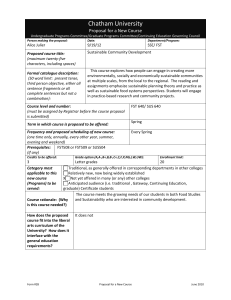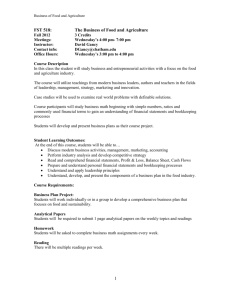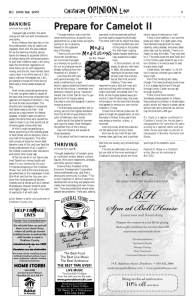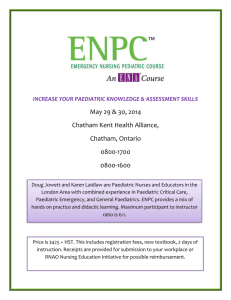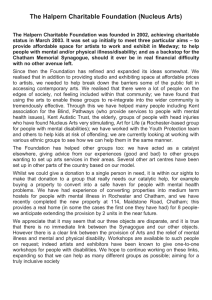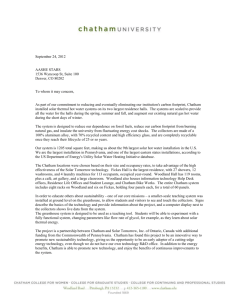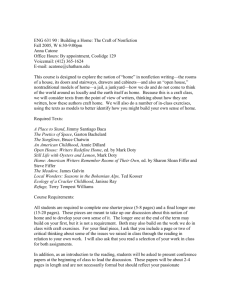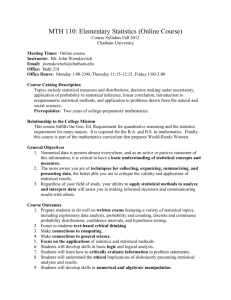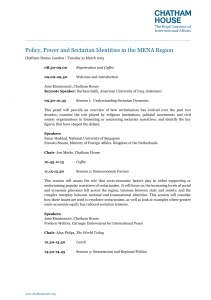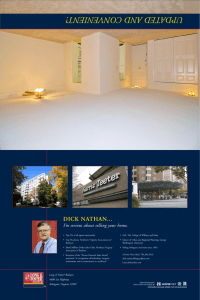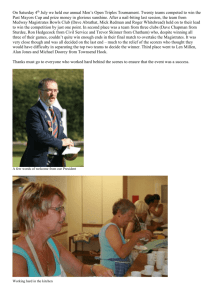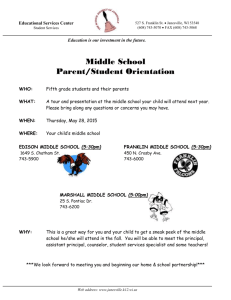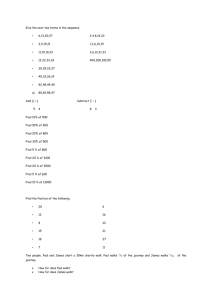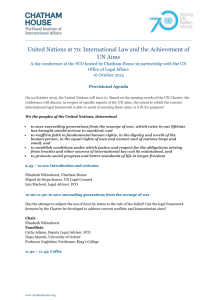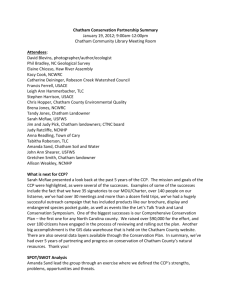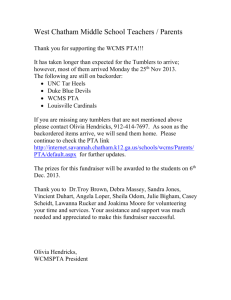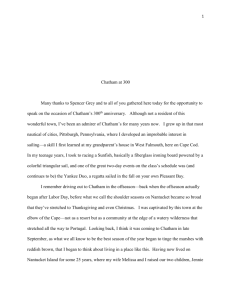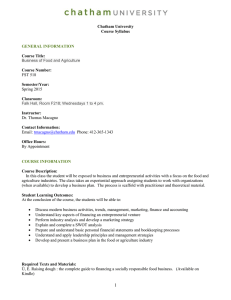2013Su_FST515WritingAboutFood_Flick
advertisement
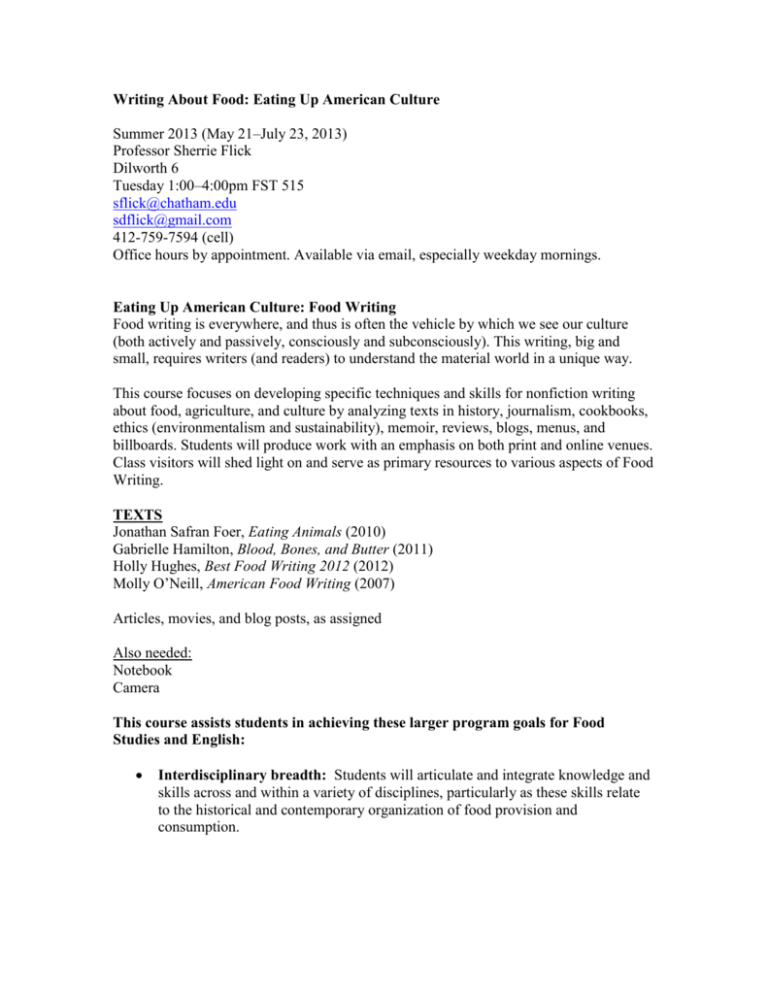
Writing About Food: Eating Up American Culture Summer 2013 (May 21–July 23, 2013) Professor Sherrie Flick Dilworth 6 Tuesday 1:00–4:00pm FST 515 sflick@chatham.edu sdflick@gmail.com 412-759-7594 (cell) Office hours by appointment. Available via email, especially weekday mornings. Eating Up American Culture: Food Writing Food writing is everywhere, and thus is often the vehicle by which we see our culture (both actively and passively, consciously and subconsciously). This writing, big and small, requires writers (and readers) to understand the material world in a unique way. This course focuses on developing specific techniques and skills for nonfiction writing about food, agriculture, and culture by analyzing texts in history, journalism, cookbooks, ethics (environmentalism and sustainability), memoir, reviews, blogs, menus, and billboards. Students will produce work with an emphasis on both print and online venues. Class visitors will shed light on and serve as primary resources to various aspects of Food Writing. TEXTS Jonathan Safran Foer, Eating Animals (2010) Gabrielle Hamilton, Blood, Bones, and Butter (2011) Holly Hughes, Best Food Writing 2012 (2012) Molly O’Neill, American Food Writing (2007) Articles, movies, and blog posts, as assigned Also needed: Notebook Camera This course assists students in achieving these larger program goals for Food Studies and English: Interdisciplinary breadth: Students will articulate and integrate knowledge and skills across and within a variety of disciplines, particularly as these skills relate to the historical and contemporary organization of food provision and consumption. 2- S. Flick – Food Writing Communicative competence: Students will use history, ethics, culture, and empirical data to document and evaluate food systems through oral, written, and multi-modal means of representation. Methodological depth: Students will articulate research questions, assess the strengths and weaknesses of different research design and collection methods. Includes the ability to address cultural and ethical issues, evaluate existing studies and results, and conceptualize field-based solutions Literary Analysis: Students will hone their skills of critical analysis and close reading by studying challenging literary texts through the lens of various schools of literary theory. Scholarly Writing: Students will develop the ability to write cogent and persuasive essays and presentations for which they design their own theoretically informed theses and arguments. Oral Communication: Students will develop the ability to articulate views in class, and enhance such skills though formal presentations. This course assists students in achieving the following specific objectives: Students will be able to recognize and analyze significant texts, genres, and styles in food writing, responding to professional models. Students will develop competence in peer review and process-based writing, editing, and revising. Students will engage in research related to writing goals. Students will be able to articulate an evaluation of effective writing for a variety of publishable venues. Students will produce and present publishable pieces. Course Requirements: Reading, attendance, class participation, and online postings. (For those of you who have not had me in class previously: I take course participation very seriously, and thus attendance VERY seriously. If you are a person who tends to miss class, this is not the class for you. If you miss two classes, you will not pass my class.) Class presentations of work-in-progress (~5-7 minutes, i.e., equivalent of 3-5 pp typed and double-spaced) One Portfolio of Food Writing essays and analysis drawn from Weekly Writing Activities and in-class exercises (10 -15 pages) with citations. Weekly Writing Activity essays (word length varies—see schedule). Weekly writing in-class exercises. Peer feedback, review, and editing work for two classmates. One-hour conference with professor, as scheduled. 3- S. Flick – Food Writing Grade Distribution: Participation, attendance, peer feedback Portfolios Conferences Writing Activities 10% 60% 10% 20% Course Policies -Attendance is required in this class; please communicate with me ahead of time about absences. o Every student enrolled at Chatham accepts the responsibility to attend all required class meetings. To obtain the fullest benefit from their courses, students must participate fully. This implies attending regularly, engaging in course activity, completing work on time, and making up work missed because of an emergency absence. It is the student’s responsibility to let the course instructor know within the drop-add period if he or she will have to miss class for religious reasons, athletics, or other. -Deductions will be taken for unexcused late papers, unexcused absences, and missed peer feedback. -In order to pass this course, you must complete all graded assignments. Assignments should be turned in on time. -Please note, I expect everyone to act civilly and courteously in classroom discussions and to be supportive of fellow students during peer feedback and classroom oral presentations. Learn from others’ viewpoints. It is the professional thing to do. TURN your personal machines OFF during class. No texting, no phone calling, no emailing. Please wait until break. I’m serious. -Syllabus is subject to change. CREDIT HOUR REQUIREMENTS Both the federal government and the state of Pennsylvania have defined the clock hours required for each credit hour offered in a standard lecture course. All Chatham courses must demonstrate that they meet these requirements. According to the Pennsylvania Department of Education, a semester credit hour represents a unit of curricular material that normally can be taught in a minimum of 14 hours of classroom instruction, plus appropriate outside preparation (PDE Code, § 31.21). Therefore, a 3-credit course should meet for a minimum of 42 hours. According to the federal government, a credit hour is an amount of work represented in intended learning outcomes and verified by evidence of student achievement that is an institutionally established equivalency that reasonably approximates not less than one hour of classroom or direct faculty instruction and a minimum of two 4- S. Flick – Food Writing hours of out of class student work each week for approximately fifteen weeks for one semester or trimester hour of credit, or ten to twelve weeks for one quarter hour of credit, or the equivalent amount of work over a different amount of time (HEA 34 CFR 600.2). All courses, including those offered fully online, in a blended format, and in a seven-week session, must meet for a minimum of 14 hours per credit, plus the final examination period. If your class is not scheduled to physically meet for the appropriate number of hours, you must include a set of Equivalent Instructional Activities (EIAs) on the syllabus showing how the contact hours will be met. For more information on EIAs, go to http://moodle.chatham.edu/course/view.php?id=2866 and click Yes to auto-enroll into the site. In addition, the work assigned to students in a course should meet the federal guideline of a minimum of two hours of out of class student work each week for each credit hour assigned to the course. For example, students in a 3-credit course should be assigned at least six hours of out-of-class work each week. This can include readings, assignments, group work, and any other preparation required for the course. University Policies Chatham University Honor Code: Chatham University students pledge to maintain the Honor Code, which states in part: “Honor is that principle by which we at Chatham form our code of living, working, and studying together. The standards of honor at Chatham require that all students act with intellectual independence, personal integrity, honesty in all relationships, and consideration for the rights and well being of others.” Information about the Honor Code is available in the Student Handbook. Cheating and Plagiarism: Cheating is defined as the attempt, successful or not, to give or obtain aid and/or information by illicit means in meeting any academic requirements, including examinations. Plagiarism is defined as the use, without proper acknowledgement, of the ideas, phrases, sentences, or larger units of discourse from another writer or speaker. Disability Statement: Chatham College is committed to providing an environment that ensures that no individual is discriminated against on the basis of her/his disability. Students with disabilities, as defined under the Americans with Disabilities Act of 1990 (ADA) and who need special academic accommodations, should notify the assistant dean of the PACE Center as soon as possible. The PACE Center will work with students and the course instructor to coordinate and monitor the provision of reasonable academic accommodations. Non-Registered Students Policy: 5- S. Flick – Food Writing In accordance with College policy, only officially registered students may attend this class and all other classes offered at the College after the drop/add period. Please confer with your academic advisor if you need assistance with the registration process or you need additional information. Minimum Grade Requirements: Graduate students must earn a grade of B- or above in all courses. Undergraduates must earn a grade of C- or above in all courses completed after spring 2011 used to fulfill major or minor requirements. Please refer to the University catalog or individual program manuals for additional information.
